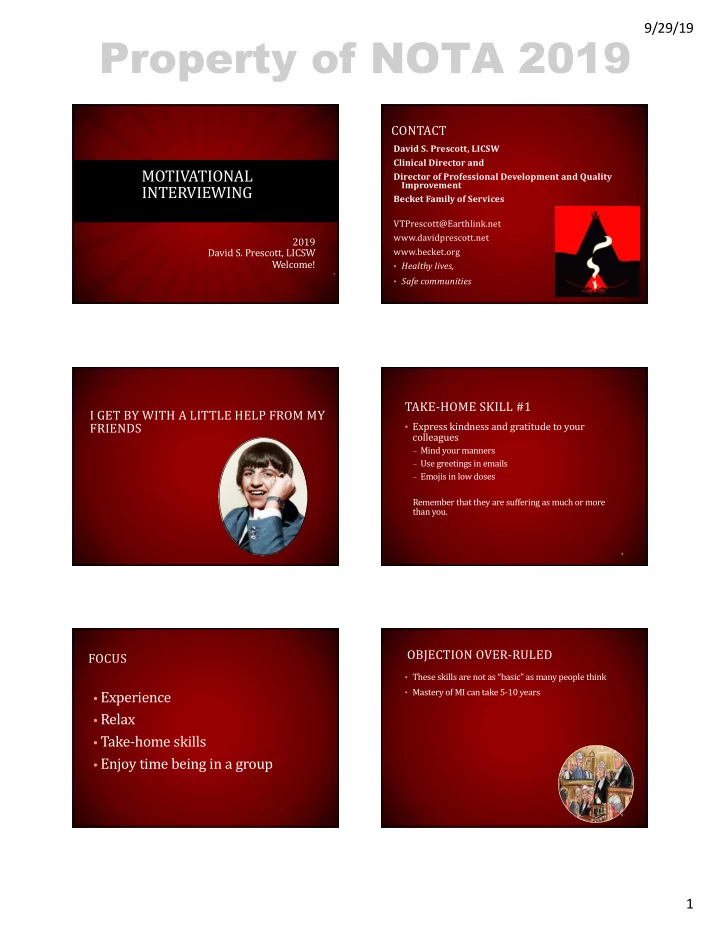

9/29/19 Property of NOTA 2019 CONTACT David S. Prescott, LICSW Clinical Director and MOTIVATIONAL Director of Professional Development and Quality Improvement INTERVIEWING Becket Family of Services VTPrescott@Earthlink.net www.davidprescott.net 2019 David S. Prescott, LICSW www.becket.org Welcome! • Healthy lives, 1 • Safe communities TAKE-HOME SKILL #1 I GET BY WITH A LITTLE HELP FROM MY • Express kindness and gratitude to your FRIENDS colleagues – Mind your manners – Use greetings in emails – Emojis in low doses Remember that they are suffering as much or more than you. 4 OBJECTION OVER-RULED FOCUS • These skills are not as “basic” as many people think • Mastery of MI can take 5-10 years • Experience • Relax • Take-home skills • Enjoy time being in a group 6 1
Property of NOTA 2019 9/29/19 Options Menu ASK YOURSELF • What’s the best session you’ve done in the past year? • What made it so effective? • What gets in the way of your doing that all the time? GOOD TEACHERS Are We Ready? What are they 0 1 2 3 4 5 6 7 8 9 10 like? Motivation = importance + Confidence TAKE-AWAY MESSAGE • People change ▫ We have proof When you’re with me… • Punishment alone does not reduce recidivism ▫ We have proof You always have • When all else fails, get back to the basics options ▫ Effective treatment gets young people to change the way they think and gets families to support those changes ▫ We will never change the way they think; they have to 2
Property of NOTA 2019 9/29/19 Obstacles to SOTP Participation TAKE-HOME MESSAGE (Mann, 2009) • Believing treatment is ineffective • Change Talk • Competing priorities • Acceptance • Concerns about side effects • Less Is More • Concerns about poor program responsivity • Righting Reflex • Distrust of key professionals • Michelangelo Belief • Expectation of hostile responses • Autonomy and Choice • Pressure from friends or family • Fear of stigma Improving the context of SOTP’s IMPROVING THE CONTEXT OF SOTP’S (Mann, 2009) (MANN, 2009) • Listen • Ensure that risk assessments take account of treatment progress • Empathize with offenders’ perspectives • Educate non-treatment staff – (Empathy is not an endorsement) • Clear leadership to promote prosocial modeling • Building relationships (collaboration, trust) and supportive environment • Identify and counter myths • Work with families and support networks – (Sometimes offenders have poor information) • Use intrinsic motivators • Communicate strength-based treatment aims • Use treatment graduates • Make referrals quickly and respectfully • Provide choice • Offer clear and transparent information about treatment and outcomes Explore and monitor Rx staff motivations 2013 PRACTITIONER’S DEFINITION • Motivational interviewing is a person- LET’S START WITH centered counseling style for addressing the common problem of ambivalence about STRENGTHS change. 17 3
Property of NOTA 2019 9/29/19 THE SPIRIT OF 2013 TECHNICAL DEFINITION MOTIVATIONAL INTERVIEWING • Motivational interviewing is a collaborative, goal-oriented style of communication with particular attention to the language of change. It is designed to strengthen personal motivation • Partnership for and commitment to a specific goal by eliciting and exploring the person’s own • Acceptance reasons for change within an atmosphere of acceptance and compassion. • Compassion • Evocation FOUR PROCESSES These processes are… • Somewhat linear – Engaging – E.g., engagement comes first • And also recursive – Focusing – Engaging happens throughout MI – Focusing is not a one-time event; – Evoking – Real treatment involves re-focusing – Planning – “testing the water” on planning helps CHANGE TALK TALK Desire “I want to…” • ß ----------------------------------------------------- à Ability “I can…” • Sustain Change Commit Reason “There are good reasons to…” • Need “I need to” • There is no such thing as “resistance” There is discord andsustain talk “I’m not gonna; you can’t make me” 4
9/29/19 Property of NOTA 2019 GETTING MOVING: OARS RESPONDING TO CHANGE TALK • When you hear change talk, don’t just stand • Open questions there! • Affirmations • Elaborate (tell me more) • Reflections • Affirm • Summaries • Reflect • Summarize REFLECTIVE LISTENING ENGAGING • Spirit factors • Simple Reflection • Open questions ▫ Exact words • Affirmations ▫ Closely related words • Reflections • Complex Reflection ▫ Continuing the paragraph • Summaries ▫ Reflecting emotion` FOCUSING EVOKING • Developing a clear direction and goal • Eliciting Change Talk – Desire, Ability, Reason, Need • Sometimes the change goal is clear; very often it’s not! – A clear focus is a prerequisite • Possibilities: – Change and sustain talk: – Clear Focus • Two sides of the same coin – Agenda Mapping (options menu) • Dancing with Discord” – Clarifying 5
Property of NOTA 2019 9/29/19 HOW DO PEOPLE CHANGE? • Challenging � distorted cognitions � ? CAN SOMEBODY • Completing assignments? TELL ME… • Following the manual? • Through their experiences and discoveries? • Or, via a relationship experience where hope How do people actually and possibility are renewed … or born. change? 6
Recommend
More recommend